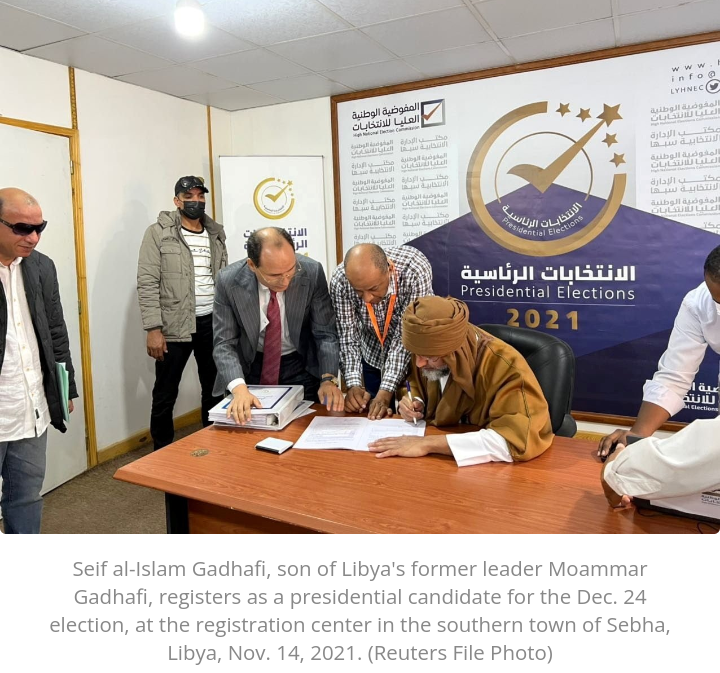The United Nations expressed concern after an appeals court, which was supposed to determine the eligibility of Libya’s late dictator Moammar Gadhafi’s son to run for the presidency, was forced to close.
The U.N. mission to Libya said in a statement that according to reports an armed group had “violently obstructed” the functioning of a court in the city of Sabha in the southwest of the country.
The judges there are responsible for deciding on whether Seif al-Islam Gadhafi, the onetime heir apparent to his father, will be able to run for the country’s top office after he filed an appeal against a decision last week that barred him from taking part. The country’s impending elections are the result of years of U.N.-led negotiations between the country’s warring parties.
The U.N. also shared alarm at the treatment of judges, who in Sabha were “physically prevented” from fulfilling their duties. It voiced further worry over a growing number of accounts of judges across the country being threatened, particularly those handling election-related cases. Candidates have a window of time before the Dec. 24 vote to file appeals related to their own candidacy or against other candidates.
Libya’s top electoral body last week issued a list of candidates who did not meet conditions to run for office; among them was Seif al-Islam, the son of and once heir-apparent to the late dictator. He was barred due to previous convictions against him. The younger Gadhafi had been sentenced to death by a Tripoli court in 2015 for using violence against protesters in a 2011 uprising against his father, but that ruling has since been called into question by Libya’s rival authorities. He is also wanted by the International Criminal Court (ICC) on charges of crimes against humanity related to the uprising.
The long-awaited vote faces other challenges, including unresolved issues over laws governing the elections, and occasional infighting among armed groups. Other obstacles include the deep rift that remains between the country’s east and west and the presence of thousands of foreign fighters and troops.
Adding to the concerns surrounding the election, the U.N.’s top envoy for Libya submitted his resignation last week, though he said he will stay on through the vote if needed.
Following the 2011 overthrow and killing of Moammar Gadhafi, oil-rich Libya spent most of the last decade split between rival governments – the internationally-recognized one based in the capital, Tripoli, and the other run by putschist Gen. Khalifa Haftar in the eastern part of the country.
The son of Libya’s former dictator submitted his candidacy papers in the southern town of Sabha on Nov. 14. It was the first time in years that the 49-year-old, who holds a doctorate from the London School of Economics, appeared in public. He had been
captured by fighters in the town of Zintan late in 2011, as the uprising ended his father’s rule after 40 years. Seif al-Islam was released in June 2017.
Libya’s presidential and parliamentary elections are set to take place on Dec. 24 under an U.N.-sponsored agreement reached by Libyan political rivals during meetings in Tunisia on Nov. 15, 2020.
Libyans hope that the upcoming elections will contribute to ending an armed conflict that has plagued the oil-rich country for years.
Libya’s first-ever direct upcoming presidential poll is the culmination of the peace process initiated last year by the U.N. to draw a line against years of violence since the revolt that toppled dictator Moammar Gadhafi in 2011.
Despite a year of relative peace following a cease-fire between the eastern and western camps, the wrangling over the legal basis for the elections threatens to derail the peace process. This has sparked fears of a return to violence in the event of a contested result.
Registration for presidential election candidates was open until Nov. 22 and for parliamentary candidates until Dec. 7 at High National Election Commission (HNEC) offices in the three main cities in Libya’s west, east and south.
More than 2.8 million of Libya’s 7 million residents have registered to vote.
Daily Sabah
